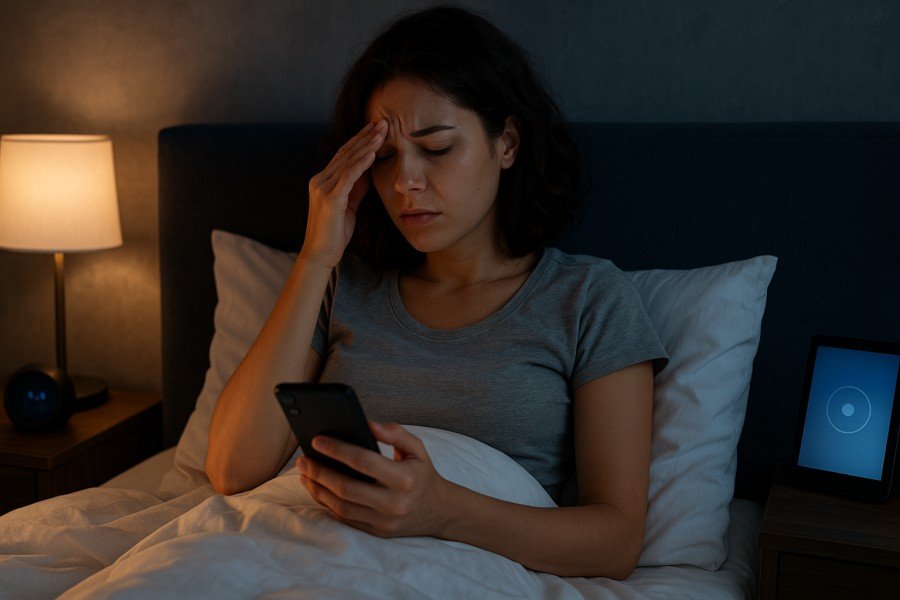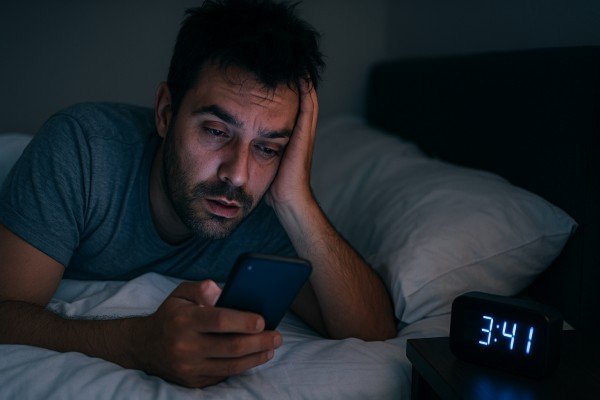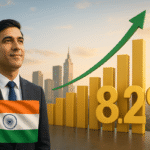In a world where technology has made nearly everything more efficient, it seems ironic that we’re sleeping worse than ever. From smart mattresses to sleep-tracking apps, our lives are filled with tools designed to help us rest better. Yet, as we move deeper into Sleep Crisis 2025, data from health organizations worldwide shows an alarming trend: people are sleeping less, feeling more fatigued, and reporting higher levels of stress and burnout than ever before.
So, what’s fueling this global Sleep Crisis 2025 in an age that promises better wellness through innovation?
The Modern Paradox: Tech That Both Helps and Hurts Sleep
Technology was meant to be our ally in achieving better rest. Smartwatches now monitor our heart rate, oxygen levels, and REM cycles. Apps like Calm and Headspace promote mindfulness and relaxation. Even home devices adjust room lighting and temperature for ideal sleep conditions.
However, our dependence on technology is also a double-edged sword. Blue light exposure from smartphones, tablets, and laptops disrupts the natural production of melatonin, the hormone responsible for regulating our sleep-wake cycle. Many of us fall asleep scrolling through social media or replying to late-night work messages, unaware of how much our screens are stealing our rest.
According to a World Health Organization study, more than 60% of adults worldwide now experience mild to chronic sleep deprivation. The culprit isn’t just poor habits it’s the growing blur between work, leisure, and rest created by digital life, all contributing to the ongoing Sleep Crisis 2025.
The Hidden Cost of the 24/7 Lifestyle
Modern work culture thrives on constant connectivity. Remote work, online meetings, and global collaboration mean we’re rarely “off the clock.” The rise of the gig economy and flexible hours may seem liberating, but it also erases traditional boundaries. For many, the bedroom has become the new office, leading to mental fatigue and inconsistent sleep schedules.
In India and other rapidly developing countries, professionals juggle long hours, traffic stress, and increasing screen time. The combination creates a perfect storm for insomnia and burnout — another clear sign of the Sleep Crisis 2025 that’s reshaping our routines and health.
It’s worth noting that the mental health crisis and the sleep crisis are deeply intertwined. Anxiety, overthinking, and information overload keep the mind racing long after bedtime. Sleep experts warn that without consistent rest, productivity, creativity, and emotional resilience decline sharply and no gadget can fully compensate for that loss.
Sleep and Society: The Bigger Picture
The Sleep Crisis 2025 isn’t just a personal issue; it’s a societal one. A tired workforce is less productive, less innovative, and more prone to mistakes. Studies from Harvard Medical School have linked sleep deprivation to increased rates of heart disease, obesity, and depression.
This has significant implications for industries, healthcare systems, and even national economies. Governments are beginning to recognize sleep as a public health priority, much like diet and exercise.
In fact, some progressive companies are taking steps to combat fatigue among employees. Tech giants like Google and Microsoft have introduced nap pods, flexible schedules, and mental health days to promote wellness. However, most organizations are still far from adopting such practices on a larger scale.

Cultural Pressures and the ‘Always-On’ Mindset
Social media glorifies hustle culture, the idea that sleeping less somehow equals success. We admire entrepreneurs who claim to thrive on four hours of sleep, forgetting that chronic exhaustion comes with long-term consequences.
In contrast, societies that emphasize balance and rest, such as in Japan and Scandinavia, are now promoting “sleep wellness” programs as part of national health initiatives. Yet even there, the invasion of digital life continues to chip away at rest quality.
Interestingly, this drive for constant success also connects to other societal trends. Just as startups in the Indian market push for innovation and rapid growth, individuals push themselves to achieve more, often at the cost of their well-being. The pressure to stay ahead is relentless, and it’s costing us our sleep.
The Path Forward: Can We Reclaim Our Rest?
The solution to Sleep Crisis 2025 lies not in abandoning technology but in using it more wisely. Experts recommend a digital sunset turning off screens at least an hour before bed, keeping phones out of the bedroom, and prioritizing relaxation rituals like reading or meditation.
In 2025, some innovators are also introducing AI-driven sleep coaching, where personalized algorithms suggest lifestyle changes to improve rest. Yet, as helpful as these tools are, the real challenge is behavioral. No app can replace discipline, balance, and self-awareness.
It’s also important to consider lifestyle factors: caffeine intake, diet, and stress management all play crucial roles. Just as GST reforms aim to bring balance to economic systems, individuals must bring balance to their own daily routines to restore healthier sleep patterns.
Final Thoughts
The sleep crisis of 2025 is a wake-up call literally and figuratively. We live in an era where convenience is king, but peace of mind has become a rare luxury. If we want to reclaim our rest, we must redefine our relationship with technology and prioritize mental well-being over constant productivity.
Because at the end of the day, no matter how advanced our gadgets become, there’s no innovation that can replace a good night’s sleep.






